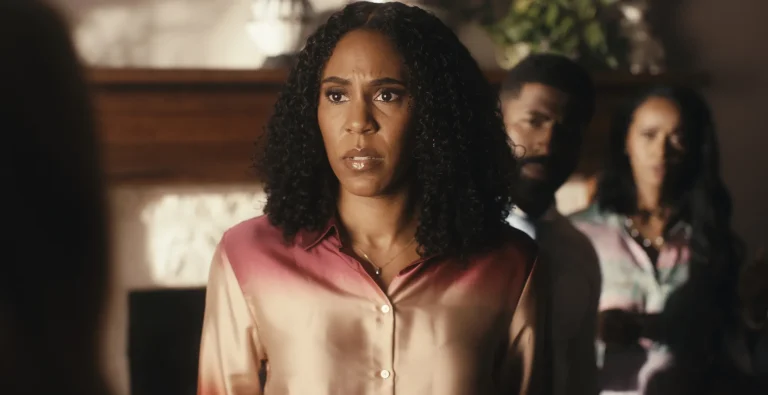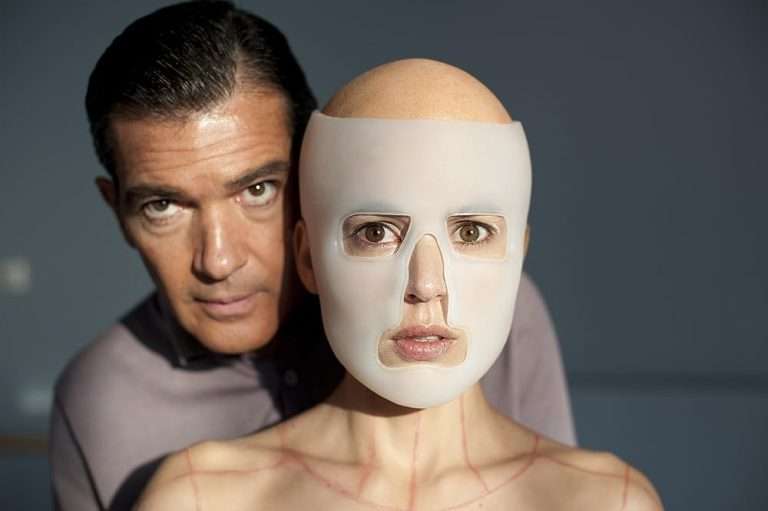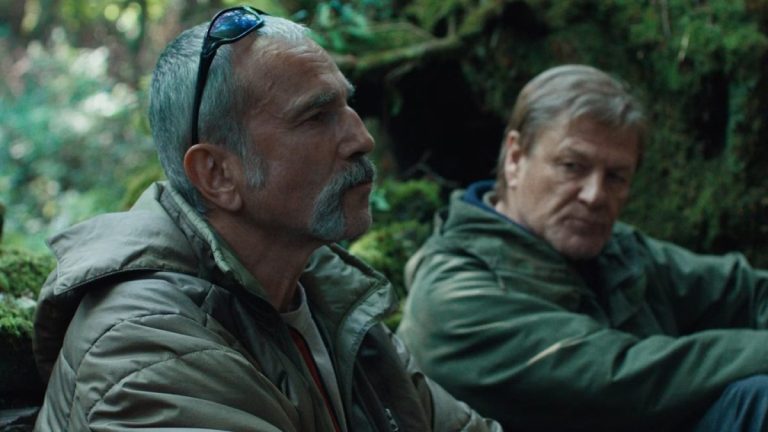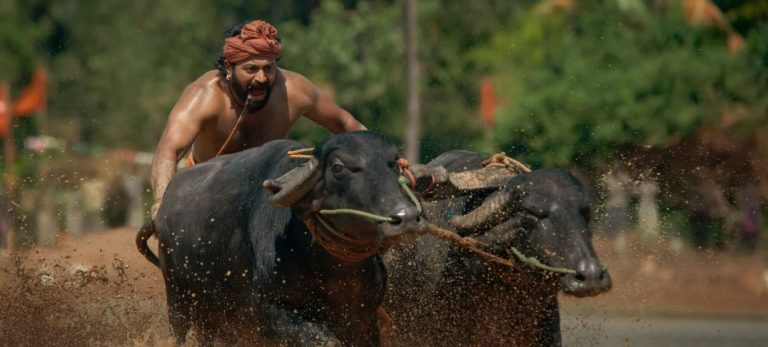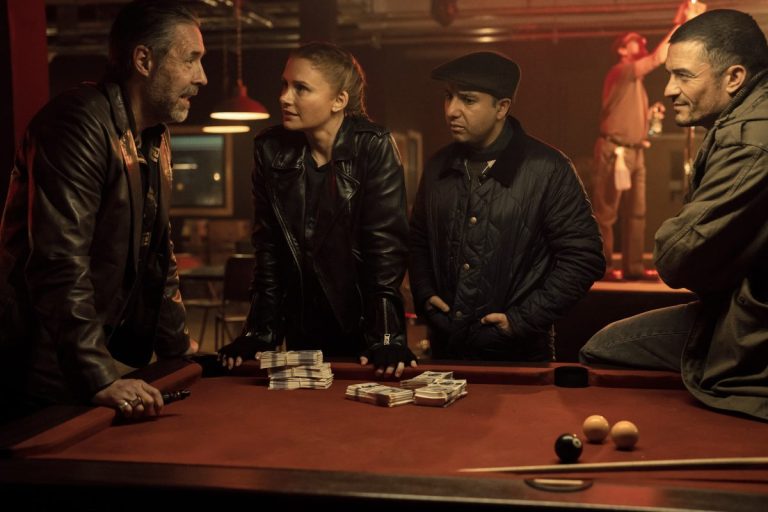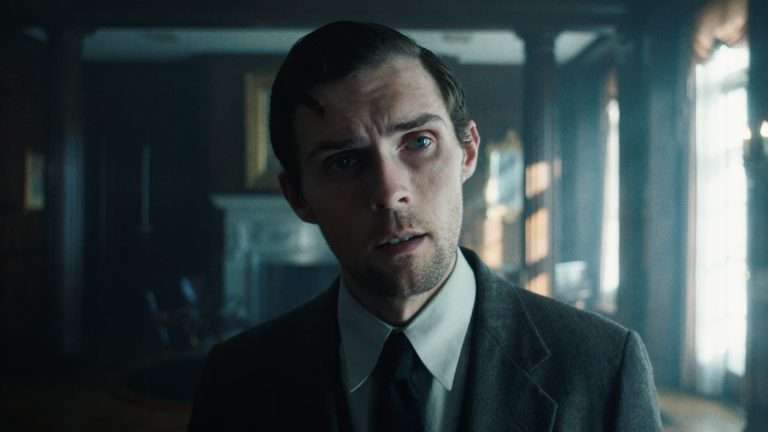Premiering at the 2011 Toronto International Film Festival’s Midnight Madness section, “You’re Next” (2011) is a comedy in the most straightforward and functional sense of the word. Adam Wingard’s thriller draws its pulse from Simon Barrett’s razor-sharp script, borrowing the unnerving rhythm of the home invasion films while threading it through concerns about capitalism and the moral rot of class conflict. More than a decade later, the visual storytelling still feels surprisingly assured: the violence lands with a cathartic, darkly comic edge where household appliances double up as both positive and negative weapons. The killers may hide behind animal masks, but the real monsters pulling the strings never need one. It’s all deliberately cold, yet calculated to be processed in specific, almost surgical ways.
Still, Wingard, with his eye for atmosphere and gift for clean staging, shows how even familiarity can find conviction. Anchored by Sharni Vinson in a role that is both inherently campy and undeniably star-making, the film weaponizes its uncompromising violence less as pulp exploitation and more as a prism to reflect its themes. The narrative twists American familial detachment into something appalling and horrifying, laying the groundwork for turns and betrayals that could only feel convincing when executed with a straight face.
It may not be the most perfect example of the genre—a claim one could extend to nearly any film elevated by cult devotion—but it is also difficult to argue that anything here exists without narrative purpose. Every moment, every setup, feels justified within the blood-soaked architecture of its story.
You’re Next (2011) Plot Summary and Movie Synopsis:
The film opens with a couple, Talia and Erik Harson, having sex. After taking a shower, Erik discovers the message “you’re next” written on the window in Talia’s blood, with her dead body lying on the ground. An attacker wearing a lamb mask then kills Erik with a machete.
Who is present at the family dinner?
Erin accompanies her boyfriend, Crispian Davison, to a family dinner at their vacation home in rural Missouri. Also present are Crispian’s parents, Aubrey and Paul; his older brother, Drake, and Drake’s wife, Kelly; his younger brother, Felix, and Felix’s girlfriend, Zee; and his younger sister, Aimee, with her boyfriend, Tariq.
What happens during dinner?
During dinner, a man in a tiger mask shoots crossbow bolts through the window, one of which kills Tariq instantly. The family tries to call the police, but their cell phone reception has been jammed. Aimee attempts to run outside for help, only to be killed by a garrote wire that slices her throat. A devastated Aubrey retreats to her bedroom, where another intruder in a fox mask murders her with a machete before writing “you’re next” in blood on the wall.
What does Paul discover?
Kelly flees to the nearby Harson house, where she finds Erik’s corpse. Lamb kills her by driving an axe into the side of her head. Crispian leaves to look for help, while Tiger attacks Erin. She counters by stabbing his arm, smashing his kneecap with a meat tenderizer, and then pulverizing his skull with the same weapon.
Paul later discovers sleeping bags, food wrappers, and bottles of urine hidden in the closet, evidence that the killers had been camping in the house for days. He presents this to Felix and Zee, insisting the attack was deliberate rather than random. Fox sneaks up and slits his throat. Felix and Zee watch coldly as Paul dies, before Felix scolds Fox for killing his father in front of him. It is revealed that Felix and Zee had hired the assassins to wipe out the family so they could claim the inheritance.
Meanwhile, Lamb finds Tiger’s corpse and becomes enraged. He encounters a wounded Drake but retreats after Erin stabs him in the back with a screwdriver. Setting nail traps around the house, Erin explains to Zee that she grew up in a survivalist compound, where she trained in combat and survival skills. Soon after, Felix kills the weakened Drake by stabbing him with screwdrivers to increase his share of the inheritance.
What happens to the assassins?
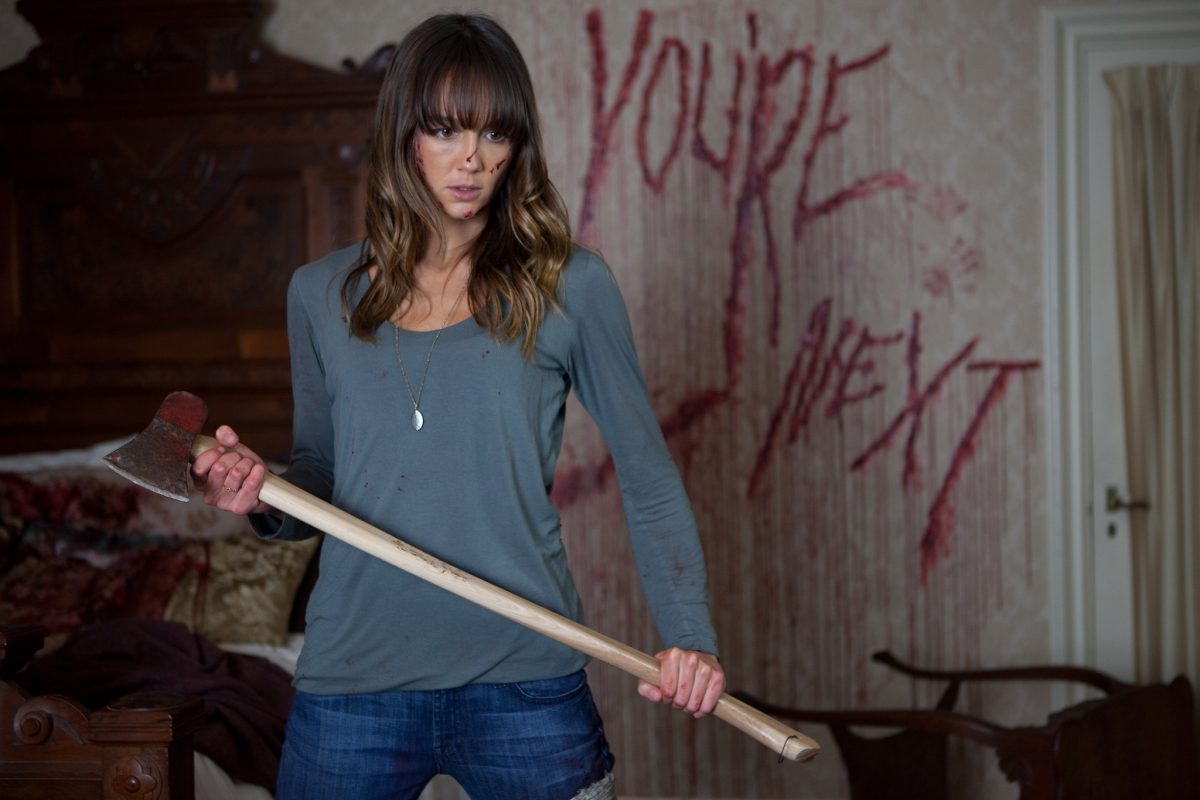
Erin dives through a window to escape Fox, injuring her leg. Lamb is hurt by one of her nail traps. Erin then overhears an argument between Felix, Zee, Fox, and Lamb, learning that Lamb and Tiger were brothers. She ambushes Lamb and fatally stabs him. Realizing she cannot outrun Fox with her wounded leg, Erin rigs a trap at the front door where an axe would fall on anyone who enters. Fox avoids this setup but is lured into the basement, where Erin kills him with a log. Zee and Felix then attack her, but Erin shreds Felix’s head with a blender and stabs Zee in the skull with a knife. When Felix’s phone rings, Erin silently answers. Believing it is Felix, Crispian confesses his role in the plot over the line.
You’re Next (2011) Movie Ending Explained:
What does Crispian admit to?
When Crispian returns, Erin confronts him. He admits she was never meant to be harmed and offers to bribe her into staying quiet. Disgusted that he would sacrifice his own family for money, Erin kills him by stabbing him in the neck and eye.
How does the police officer die?
A police officer arrives, sees Erin killing Crispian, and shoots her in the shoulder. Ignoring her frantic attempts to stop him, he enters the house and becomes the final victim of her axe trap.
You’re Next (2011) Movie Themes Analysed:
Survivalism and Female Agency
On the surface, calling the core narrative of “You’re Next” feminist can be dismissed as political exaggeration. Flip the gender of these characters, and a man raised in survivalist circumstances might have done the same. Yet the story speaks to Erin’s conscience in a way that firmly hands her the agency behind her every act. This is because the tendency to corruptly manipulate one’s surroundings is an inherently patriarchal construct. By giving Erin the final authority to kill her boyfriend through her unheard inner voice, the film frames her agency as the true force driving the story.
In that regard, her arc also becomes a pointed subversion of the Final Girl trope—she isn’t someone “chosen by fate.” Until the massacre erupts, she is arguably the most sensitive and alive presence of the lot. Which is why the reveal that her preparedness is rooted in experience feels both fucked-up and instantly gratifying. The detail of her upbringing in a survivalist compound adds plausibility to her competence, since it was fuelled by her father’s anxieties over dwindling resources. So, a patriarchal solution is handed over to a patriarchal problem, but its responsible delivery becomes the woman’s task. While not radical in itself, this approach creates a distinctly potent viewing experience.
Another sharp stroke here is the framing of female resilience as tactical empowerment. A focus solely on Sharni Vinson’s performance might have reduced Erin to her circumstantial trauma. The film avoids this, showing instead how she doesn’t endure her enemies but outright dominates them. Even the improvised traps she lays turn out to be lethally effective.
Class and Capitalism
Beyond being a wildly entertaining slasher film—a prerogative it delivers with precision—”You’re Next” also doubles as a dark comedy about the lurking horrors of greed. The brothers’ lust for inheritance severs warmth early on, and the film makes no effort to disguise it. Money eclipses everything—kinship, morality, even survival. Cultures often clash over moral values and their reconciliation with the pursuit of wealth. Ironically, the highest marker of virtue in a family is often thought to be the indifference to how much property a kin receives. By reversing this, the film twists its genre structure into a brutal extension of familial conflict.
The Davison household reflects a stereotypical American upper-middle-class family gathering, but underneath lies bitterness, rivalry, and dysfunction. Greed transforms their dinner into a capitalist slaughterhouse. Self-interest and resentment eclipse loyalty to such an extent that killing one’s father, mother, and brother becomes a justified pursuit of material fullness. In that way, the ‘killer’ instincts of the narrative become almost grimly spiritual. It becomes a critique of upper-class decay, a world thriving on its displaced intellectualism and amoral selfishness.

